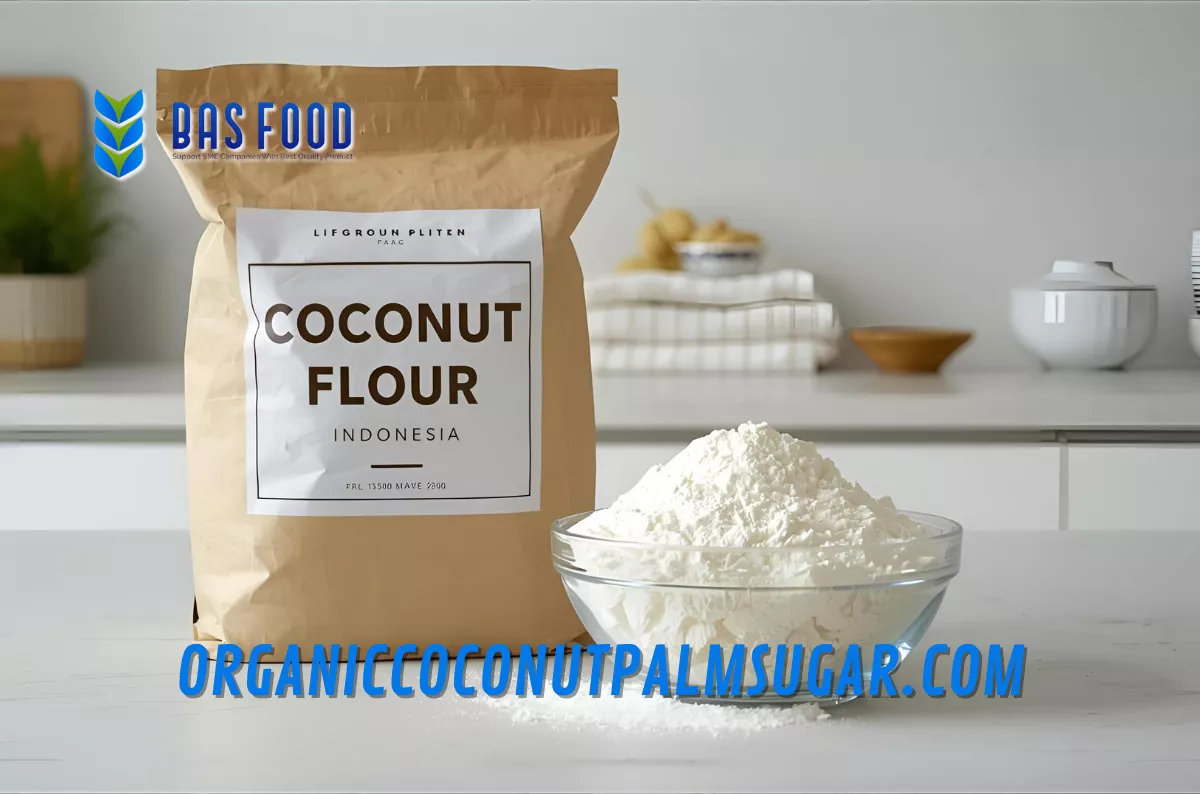Coconut flour has quietly evolved from a niche ingredient into a global staple. Once known only to tropical countries, this soft, white powder made from dried coconut meat is now in demand across the world. In 2025, the coconut flour global market is showing remarkable growth as consumers and food manufacturers alike embrace healthier, gluten-free alternatives to wheat flour.
The demand surge is driven by three major forces: health-conscious consumers, the growth of plant-based diets, and the continued rise of the functional food sector. As countries in Europe, North America, and Asia-Pacific ramp up imports, exporters in Indonesia, the Philippines, and Sri Lanka are seeing record sales.
One of the notable contributors to this global trade is CV Bonafide Anugerah Sentosa, a trusted coconut supplier and spices exporter from Indonesia. Their commitment to quality and sustainability helps meet the rising demand for premium coconut-based products, including coconut flour.
.
What Makes Coconut Flour So Popular Globally?
The rise of coconut flour in global markets didn’t happen overnight. Its popularity stems from its impressive nutritional profile and versatility in cooking. Coconut flour is naturally gluten-free, high in fiber, low in carbohydrates, and rich in healthy fats—making it a favorite among health enthusiasts, bakers, and food manufacturers alike.
In many countries, particularly the United States and parts of Europe, people are looking for cleaner labels and plant-based alternatives. This shift has accelerated the coconut product demand, with coconut flour leading the way due to its compatibility with keto, paleo, and vegan diets. It blends seamlessly into pancakes, bread, pastries, and even protein bars.
Additionally, the sustainability aspect plays a key role. Coconut flour is made from coconut byproducts—specifically the residue after extracting coconut milk—so it supports a zero-waste production model. That makes it an eco-friendly choice for both producers and consumers, aligning with the growing organic flour trends in the global food industry.
Global Market Overview and Key Growth Regions
According to trade data and recent market research, the coconut flour global market in 2025 is valued at over USD 600 million, with an annual growth rate exceeding 7%. The Asia-Pacific region remains the largest producer, while North America and Europe dominate in consumption.
The United States is currently the biggest importer, thanks to its booming health food industry and gluten-free product innovations. Europe follows closely behind, especially in countries like Germany, the UK, and France, where demand for sustainable and organic products continues to climb. Meanwhile, markets in Japan, South Korea, and Australia are also expanding rapidly, driven by the rising popularity of superfoods and plant-based ingredients.
Indonesia, the Philippines, and Sri Lanka continue to lead as major exporters, contributing a significant share of global supply. Indonesian suppliers like CV Bonafide Anugerah Sentosa play a vital role in maintaining consistent quality and sustainability, supporting both smallholder farmers and large-scale buyers across international markets.
Organic Flour Trends Shaping the Future
The organic flour trends of 2025 show a clear pattern: consumers want purity, traceability, and ethical sourcing. As food safety regulations tighten, the organic certification of coconut flour is becoming not just a selling point but a necessity for entering high-value markets such as the EU and North America.
Organic coconut flour commands a premium price, but consumers are willing to pay more for quality assurance and health benefits. Many brands now emphasize certifications like USDA Organic, EU Organic, and Fair Trade on their packaging. This focus on transparency strengthens consumer trust and encourages more investment in organic farming practices in producing countries.
CV Bonafide Anugerah Sentosa is among the exporters that understand this demand shift. They work closely with local farmers in Indonesia to produce high-quality organic coconut flour while maintaining ethical production standards. Their integrated supply chain ensures that the product meets both health and sustainability criteria, which is key to thriving in the modern export market.
The Role of Coconut Flour in the Global Food Industry
Coconut flour isn’t just a trend—it’s becoming a permanent fixture in the global food ecosystem. Major food manufacturers are incorporating it into bakery mixes, gluten-free snacks, and ready-to-eat health foods. The combination of texture, mild flavor, and nutritional benefits makes it a highly adaptable ingredient.
In the B2B market, coconut flour is gaining popularity in the production of protein bars, smoothies, pancake mixes, and infant food. Its natural sweetness reduces the need for added sugars, while its high fiber content enhances product texture and satiety. These functional advantages are fueling coconut flour export opportunities for Southeast Asian suppliers.
Food service industries, including bakeries and restaurants, are also embracing coconut flour as an alternative to wheat-based products. This adoption across both retail and foodservice sectors highlights how deeply embedded coconut flour has become in the modern food landscape.
Export Opportunities and Competitive Landscape
The coconut flour export market in 2025 is more competitive than ever. Exporters from Indonesia, the Philippines, India, and Vietnam are strengthening their global presence by investing in better processing facilities and logistics infrastructure. Quality control, certification, and packaging innovation are becoming key differentiators in winning international clients.
Indonesia, in particular, stands out as a hub of premium coconut-based exports. Its vast coconut plantations, skilled workforce, and government support for agro-industrial growth make it a reliable supplier. CV Bonafide Anugerah Sentosa, for example, combines modern processing technology with traditional expertise to deliver consistent, export-grade coconut flour to buyers across Europe, the US, and Asia.
To remain competitive, exporters are focusing on organic certification, traceable supply chains, and sustainability reporting. Buyers, on the other hand, are increasingly choosing suppliers who can guarantee transparency, ethical sourcing, and compliance with food safety standards.
Coconut Product Demand Beyond Flour
While coconut flour is in the spotlight, it’s part of a broader surge in coconut product demand. Coconut water, coconut milk, coconut sugar, and MCT oil are all gaining momentum in the health and wellness market. Consumers now associate coconuts with clean, sustainable nutrition, making the entire coconut value chain thrive.
This growing demand benefits suppliers like CV Bonafide Anugerah Sentosa, who offer a full range of coconut derivatives—from coconut flour and sugar to coconut water concentrate and MCT oil. By diversifying their coconut product line, they can serve a wider range of international buyers and strengthen Indonesia’s position in the global coconut industry.
Furthermore, as governments and international organizations push for sustainable agriculture, coconut-based products are positioned as part of the solution. They provide livelihood opportunities to farmers, reduce food waste, and contribute to a circular economy.
Future Outlook – What’s Next for the Coconut Flour Global Market?
Looking ahead, the coconut flour global market shows no signs of slowing down. Analysts predict steady growth driven by increasing health awareness, innovation in food manufacturing, and expanding export markets. The introduction of new food products using coconut flour—like gluten-free pasta, cookies, and protein powders—will further fuel the trend.
Technological advances in drying, grinding, and packaging will also help exporters improve efficiency and reduce costs. As logistics and e-commerce continue to evolve, even small producers can access international buyers more easily.
In this context, partnerships between exporters like CV Bonafide Anugerah Sentosa and overseas importers will be crucial. Reliable suppliers with consistent quality and sustainable practices will shape the future of coconut flour trade, ensuring long-term growth for the industry.
Conclusion: Coconut Flour’s Moment Has Just Begun
In 2025, the coconut flour global market is not just growing—it’s thriving. From bakery aisles to protein shake shelves, coconut flour represents the future of clean, sustainable food production. Its rise reflects a deeper consumer shift toward health, ethics, and environmental responsibility.
Exporters in Indonesia, including CV Bonafide Anugerah Sentosa, are at the heart of this evolution. As a trusted coconut supplier and spices exporter, they continue to bridge the gap between tropical farms and global tables. The journey of coconut flour is far from over—in fact, it’s only just beginning.
Contact CV Bonafide Anugerah Sentosa how we can provide the best solutions for you. WhatsApp: +62 8213 4505 737, Email: info@bonafideanugerahsentosa.com / bas.mdir@gmail.com.

